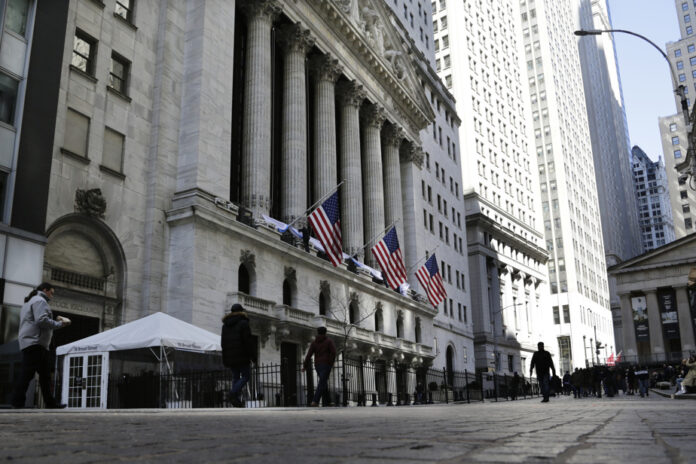(Paris) Stock markets confirmed on Tuesday their rebound that began the day before, the crisis of confidence in the financial system seeming to ease thanks to the various measures taken to limit the risks of contagion, investors focusing on the meeting of the central bank US (Fed).
European financial centers rose copiously by 1.42% in Paris, 1.75% in Frankfurt and 1.79% in London, without however offsetting the losses of the past week generated by fears about the solidity of the banking system. .
Roughly attacked last week, banking stocks continued to raise the bar like UBS (12.12%), Deutsche Bank (6.05%), Commerzbank (7.44%) and BNP Paribas ( 4.15%) and Societe Generale (4.30%).
After its heavy setbacks, Credit Suisse regained 6.96% and the American bank First Republic, still rolled on Wall Street on Monday, soared by almost 30%.
This rebound in banking securities comes two days after the rescue in extremis of Credit Suisse, bought a pittance by its competitor and compatriot UBS.
The New York Stock Exchange also regained ground, supported by a rebound in bank stocks: the Dow Jones index advanced 0.98%, the broader index S
After the big losses recorded last week, bond yields also rebounded.
For Steve Sosnick, chief strategist at Interactive Brokers, “banking issues have taken a back seat”: “It may be a little early to say we’re completely out of the woods, but we haven’t haven’t heard of any new bank issues this week and that’s good news for the market.”
Nevertheless, according to independent analyst Andreas Lipkow, “developments in the US financial sector are still being watched and the behavior of the Fed tomorrow (Wednesday) should not be underestimated.”
Governments and monetary authorities, both in the United States after the bankruptcy of Silicon Valley Bank (SVB) and Signature Bank, and in Europe with Credit Suisse, have provided strong responses to reassure.
Despite severe turbulence since the collapse of SVB, depositor confidence “is strong” in European banks, which are deemed to be sound, Andrea Enria, a senior official at the European Central Bank (ECB), said on Tuesday.
Speaking to the American Bankers Organization (ABA) in Washington, US Treasury Secretary Janet Yellen assured that the Fed’s responses over the past week “are working as intended to provide liquidity to the banking system” and that ” cash withdrawals from regional banks have stabilized”.
After the ECB, which last week continued the course of monetary tightening without committing to the next rate movement, investors will observe the reaction of the Fed, which is due to deliver its monetary policy decision on Wednesday after two meeting days.
Investors have drastically lowered their expectations of the peak in key rates, the main tool of central banks to fight inflation, in the name of financial sector stability.
“The Fed’s exercise is therefore certainly not the easiest, but could be simplified by the flexibility offered to it, at least on paper, by the position it has favored until now, namely: nothing is predefined,” according to Véronique Riches-Flores, economist at RichesFlores.
All options are open, she notes, “including the possibility of returning to significantly more aggressive policy over time, if, with the current banking crisis contained, the US economy continues on its current growth trajectory.”
The euro rose 0.83% to $1.0769 around 5 p.m. EST. The dollar thus fell to its lowest level in five weeks against the European currency.
The barrel of Brent North Sea gained 2.07% to 73.79 dollars and the American WTI 2.49% to 67.64 dollars.
North American stock markets closed higher on Tuesday for a second straight session, with the Toronto Stock Exchange notably supported by strength in the energy and financials sectors.
The composite index S
Markets posted broad-based gains on Tuesday, a good sign risk appetite is back after last week’s volatility, said Mike Archibald, vice president and portfolio manager at AGF Investments.
The market has handled a series of bad news relatively well, Archibald said, and it appears investors think the worst of the confidence crisis is behind them, as Treasury Secretary Janet Yellen’s comments about “stabilizing of the situation that helped boost their morale.
Another positive sign has been the recovery of the U.S. financial sector, particularly among regional banks, Archibald pointed out.
“Everyone has a problem when finances have a problem,” he said.
The big news of the week will be the Federal Reserve’s interest rate announcement on Wednesday, Archibald said. Market expectations for what the announcement will hold have shifted since the events of last week, with most now pricing in a quarter-percentage-point rise and more dovish word choice than in previous announcements, so that the central bank is trying to balance the fight against inflation with concerns about the financial system.
Markets are still pricing in rate cuts in the second half of 2023, but Archibald thinks comments from the Fed on Wednesday could dash those hopes.
Meanwhile, new Canadian inflation data for February showed price growth continuing to slow, and with oil prices falling in March, likely to lead to even slower inflation for the next release. , all points to an extension of the Bank of Canada’s pause on interest rates, Archibald continued.
Investors’ appetite for risk prompted the sale of more defensive investments on Tuesday, Archibald added, as gold, utilities and telecoms were weaker amid the market rally.
In the currency market, the Canadian dollar traded at an average rate of 72.96 cents US, down from 73.13 cents US on Monday.
On the New York Commodities Exchange, the price of crude oil climbed US$1.85 to US$69.67 a barrel, while that of natural gas climbed US13 cents to US$2.35 million BTUs.
The price of gold plunged US$41.70 to US$1,941.10 per ounce and that of copper rose US4 cents to US$3.99 per pound.















